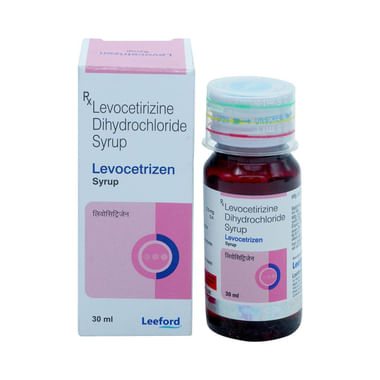Lazine Syrup
 Prescription Required
Prescription Required

Your child’s medicine at a glance
Lazine Syrup can be given with or without food. Your required dose may depend on the condition being treated. While this medicine is generally best given to your child in the evening, always follow your doctor’s instructions for proper use. Continue giving for as long as the doctor has prescribed. If it is stopped earlier than advised, your symptoms may come back.
The most common side effects include feeling sleepy or dizzy, dry mouth, fatigue, fever, cough, vomiting, and diarrhea. These are usually mild and go away after a couple of days as your body adjusts to it. Consult your doctor if any of the side effects persist or worsen.
Before taking it, tell your doctor if you have any kidney problems or epilepsy (seizures). Your dose may need to be modified, or this medicine may not suit you. Certain medications may interact with this one, so inform your doctor about any other medicines you are taking. If you are pregnant or breastfeeding, consult your doctor before use, even though it is not considered harmful.
Uses of Lazine Syrup in children
Benefits of Lazine Syrup for your child
In Treatment of Allergic conditions
Side effects of Lazine Syrup in children
Common side effects of Lazine
- Drowsiness
- Sleepiness
- Fatigue
- Dryness in mouth
- Nasopharyngitis (inflammation of the throat and nasal passages)
- Sore throat
- Fever
- Cough
- Nosebleeds
- Vomiting
- Otitis media (infection of ear)
- Diarrhea
- Constipation
How can I give Lazine Syrup to my child?
How Lazine Syrup works
Safety advice
What if I forget to give Lazine Syrup to my child?
All substitutes
Quick tips
- Try giving the medicines at the same time each day to help you remember.
- Your child may feel sleepy or dizzy after each dose of Lazine Syrup. If this happens, make your child sit or lie down and ask them to be careful while performing tasks that require mental focus.
- Avoid giving Lazine Syrup with fatty meals and fruit juice, as both can reduce the absorption of the medicine.
- Lazine Syrup can trigger constipation in your child. Give plenty of fluids and a fiber-rich diet to your child.
- Lazine Syrup should be avoided in children who are less than 4 years of age, as there is a risk of respiratory distress.
Fact Box
Interaction with drugs
Patient concerns
User feedback
FAQs
My child is restless and unable to sleep properly at night. Can I give Lazine Syrup?
Can other medicines be given at the same time as Lazine Syrup?
How much Lazine Syrup should I give to my child?
What if I give too much of Lazine Syrup by mistake?
How should Lazine Syrup be stored?
When do I need to call my child’s doctor right away?
Disclaimer:
Tata 1mg's sole intention is to ensure that its consumers get information that is expert-reviewed, accurate and trustworthy. However, the information contained herein should NOT be used as a substitute for the advice of a qualified physician. The information provided here is for informational purposes only. This may not cover everything about particular health conditions, lab tests, medicines, all possible side effects, drug interactions, warnings, alerts, etc. Please consult your doctor and discuss all your queries related to any disease or medicine. We intend to support, not replace, the doctor-patient relationship.References
Marketer details
Lab tests offered by us







